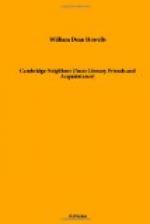It must have seemed incomprehensible to such a Cantabrigian that we should ever have been willing to leave Cambridge, and in fact I do not well understand it myself. But if he resented it, he never showed his resentment. As often as I happened to meet him after our defection he used me with unabated kindness, and sparkled into some gaiety too ethereal for remembrance. The last time I met him was at Lowell’s funeral, when I drove home with him and Curtis and Child, and in the revulsion from the stress of that saddest event, had our laugh, as people do in the presence of death, at something droll we remembered of the friend we mourned.
My nearest literary neighbor, when we lived in Sacramento Street, was the Rev. Dr. John G. Palfrey, the historian of New England, whose chimney-tops amid the pine-tops I could see from my study window when the leaves were off the little grove of oaks between us. He was one of the first of my acquaintances, not suffering the great disparity of our ages to count against me, but tactfully and sweetly adjusting himself to my youth in the friendly intercourse which he invited. He was a most gentle and kindly old man, with still an interest in liberal things which lasted till the infirmities of age secluded him from the world and all its interests. As is known, he had been in his prime one of the foremost of the New England anti-slavery men, and he had fought the good fight with a heavy heart for a brother long settled in Louisiana who sided with the South, and who after the civil war found himself disfranchised. In this temporary disability he came North to visit Doctor Palfrey upon the doctor’s insistence, though at first he would have nothing to do with him, and refused even to answer his letters. “Of course,” the doctor said, “I was not going to stand that from my mother’s son, and I simply kept on writing.” So he prevailed, but the fiery old gentleman from Louisiana was reconciled to nothing in the North but his brother, and when he came to return my visit, he quickly touched upon his cause of quarrel with us. “I can’t vote,” he declared, “but my coachman can, and I don’t know how I’m to get the suffrage, unless my physician paints me all over with the iodine he’s using for my rheumatic side.”
Doctor Palfrey was most distinctly of the Brahminical caste and was long an eminent Unitarian minister, but at the time I began to know him he had long quitted the pulpit. He was so far of civic or public character as to be postmaster at Boston, when we were first neighbors, but this officiality was probably so little in keeping with his nature that it was like a return to his truer self when he ceased to hold the place, and gave his time altogether to his history. It is a work which will hardly be superseded in the interest of those who value thorough research and temperate expression. It is very just, and without endeavor for picture or drama it is to me very attractive. Much that has to be recorded of New England lacks




